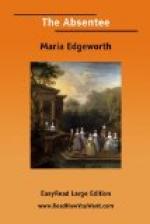’Petito! don’t run on so; you must not meddle with what you don’t understand: the Miss Killpatricks, to be sure, are sweet girls, particularly the youngest.’—Her ladyship’s toilette was finished; and she left Petito to go down to my Lady Killpatrick’s woman, to tell, as a very great secret, the schemes that were in contemplation among the higher powers, in favour of the youngest of the Miss Killpatricks.
‘So Ireland is at the bottom of his heart, is it?’ repeated Lady Dashfort to herself; ‘it shall not be long so.’ From this time forward, not a day, scarcely an hour passed, but her ladyship did or said something to depreciate the country, or its inhabitants, in our hero’s estimation. With treacherous ability, she knew and followed all the arts of misrepresentation; all those injurious arts which his friend, Sir James Brooke, had, with such honest indignation, reprobated. She knew how, not only to seize the ridiculous points, to make the most respectable people ridiculous, but she knew how to select the worst instances, the worst exceptions; and to produce them as examples, as precedents, from which to condemn whole classes, and establish general false conclusions respecting a nation.
In the neighbourhood of Killpatrickstown, Lady Dashfort said, there were several squireens, or little squires; a race of men who have succeeded to the BUCKEENS, described by Young and Crumpe. SQUIREENS are persons who, with good long leases, or valuable farms, possess incomes from three to eight hundred a year; who keep a pack of hounds; take out a commission of the peace, sometimes before they can spell (as her ladyship said), and almost always before they know anything of law or justice! Busy and loud about small matters; jobbers at assizes, combining with one another, and trying upon every occasion, public or private, to push themselves forward, to the annoyance of their superiors, and the terror of those below them.




